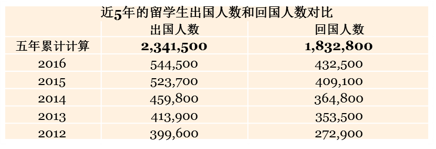尊敬的用戶您好,這是來自FT中文網的溫馨提示:如您對更多FT中文網的內容感興趣,請在蘋果應用商店或谷歌應用市場搜尋「FT中文網」,下載FT中文網的官方應用。
RETURNING TO THE LAND OF OPPORTUNITIES, AND FIERCE COMPETITION: HOW TO JUMPSTART A CAREER IN CHINA
如何在機遇與競爭並存的中國更快進階職場
Between a perceived glass ceiling overseas and intense job competition in China, many Chinese who have gone to university or graduate schools abroad are discovering that desirable employment is not that easy to come by.
面對國外求職的潛在天花板障礙、國內就業市場的激烈競爭,海外留學生開始發現,不管身處何處,求得一份理想工作都不簡單。
With a surprisingly robust GDP growth of 6.9% in Q1 2017, the largest increase in the past year and half, many global investors are bullish on the Chinese economy as it shifts away from export-led manufacturing. Powered by government investment in crucial technologies and industries, such as clean energy, advanced materials and the like, China is on the threshold of a game-changing transition to become the world’s leading economy. Coinciding with an overseas backlash against the globalization that has underpinned China’s past thirty years of economic development, this vision of China’s dynamism is attracting returnees and foreigners alike to build a career in China.
中國經濟發展強勢成長,2017年首季GDP成長6.9%,是近一年半來最大升幅。目前中國逐漸降低對出口導向製造業的依賴,許多全球投資者對中國經濟更爲看好。中國政府大力推進對乾淨能源、先進材料等重點科技行業的投資,助力中國經濟完成重大轉型並躍身引領全球經濟。在其它國家開始對全球化持懷疑態度、逐漸減緩發展腳步的當下,擁有發展雄圖及動力的中國,更吸引了大量海外留學生和國外職場人士。
「我身邊的大多數留學生朋友都選擇回國發展,我們都看好中國發展潛力和機遇,」就讀於美國俄亥俄州立大學的戴嘉本(音譯),在接受《人民日報》採訪時如是說。戴的同學也對自己能回國對祖國發展有所貢獻感到驕傲。
According China’s Ministry of Education, more than 4 million Chinese nationals studied abroad from 1978 to 2016. 2.2 million of them have since returned to China, with the pace of return accelerating in the past few years. The Chinese government since 2012 has increasingly promoted favorable policies for bringing “overseas talent” back to China. Many Chinese students never really adjusted to the cultural or linguistic environments in their host country. China’s continuing high economic growth has created a sense of dynamic professional opportunities. It is no wonder that more and more Chinese professionals are opting to return to their native land.
根據中國教育部統計,超過四百萬名中國學生在1978年到2016年間遠赴海外留學。當中二百二十萬人已經回國,留學生歸國人數成長幅度近年顯著上升。許多留學生不習慣海外文化、語言環境,回國意願高;同時,中國經濟高速成長下帶來大量工作機遇,中國政府更從2012年起推行的各項優惠政策,越來越多中國籍專業人才選擇洄游中國市場。
But, according to a report on overseas returnees published at the end of 2016, more than 60 percent of those who have found jobs work in lower than desired positions with salaries that fall short of their expectations. The large number of returnees have similar backgrounds and are similarly competitive. They are all seeking jobs in first-tier cities, as are the millions of domestic college graduates, and thousands of people apply for every advertised position. Unlike even ten years ago, it is difficult to distinguish oneself from the competition. Returnees also suffer from having to adapt to a business and work environment that is very different from when they left. Domestic graduates remained embedded in local networks and retain familiarity with the Chinese environment.
「海龜」和中國對管理人才的需求

根據2016年出版的一份有關歸國留學生的調查報告顯示,超過六成就職人士認爲其工作職位和待遇與預期中有落差。大多數歸國留學生擁有極其相似的專業背景與競爭力,又多數希望能在一線城市工作,這意味著他們不得不和上百萬個國內大學生一同競爭於國內職場,每一個職位空缺都有幾千人報名申請已經成爲市場常態。這一遠比過往更嚴峻的求職環境,使得擁有海外留學背景的求職者不再具有優勢。比起熟悉當地環境和人脈的國內畢業生,歸國留學生必須重新面對全新商業環境帶來的挑戰。
A CEO survey conducted by PwC (January 2017) found that 77% of CEOs interviewed worry that skills shortages could impair their company’s growth. And they say it’s the soft skills they value most that are hardest to find. Creative, innovative leaders with emotional intelligence are in very short supply. If anything, indeed, they’re even thinner on the ground than they were in 2008, when a previous survey asked a similar question, whereas people with technological skills are more plentiful than before.

In order to re-integrate, returnees will need to build their understanding of the China workplace environment and reintegrate, demonstrating local acumen as well as bringing their global acumen to the table. They will need to build their local networks quickly, and “happy hours” don’t quite do the trick. Effective networks are those that are selective and influential and accessed by means of reference from others. Returnees need to get their contacts to introduce them to relevant people. But even before that, they need to understand their needs, wants and strengths, and sharpen their relationship building skills. In short, they will need to develop a personalized strategy to access a changed China. They will need to build out contacts, build up experiences and basic skills, connect with influential professionals and influential leaders, develop self-awareness and learn how to harness their international experience to flourish in a changing China.
普華永道於2017年一月發佈的年度全球CEO調查報告中顯示百分之七十七受訪公司CEO擔心人才技能的短缺會對公司成長形成阻礙。其中,企業最看重卻也最難獲取的就是軟技能出色的人才。由於專業技術已經普及,相對2008年的問卷回應,如今企業明顯更迫切需要具有創造力、創新思維和高情商的領導人才。

想要更好的適應國內的職場環境,歸國留學生必須瞭解並與中國的職場環境接軌,權衡和利用自己的本土經驗及國際視野,並快速地建立商務人脈。「把酒言歡」的社交模式顯然並不適用於商務人脈的建立,有價值有選擇的人脈通常需要由身邊的社交圈爲你引薦,所以留學生本身也需要足夠優秀來吸引優質的社交圈,並藉此認識更多的職場關鍵人士。所以,他們需要充分了解自己的需求、目標和優勢,同時磨練自己的人際關係技巧。
簡言之,留學生成功洄游中國市場,需要個性化的策略以融入中國的職場環境;需要建立有效人脈,磨練經驗和技能;需要發展自我認知並學習如何在日新月異的中國環境中運用自己的國際視野。
針對進階職場中的各類挑戰,職場人需要相應對策。關注瞭解普華永道You Plus特訓計劃相關內容。
